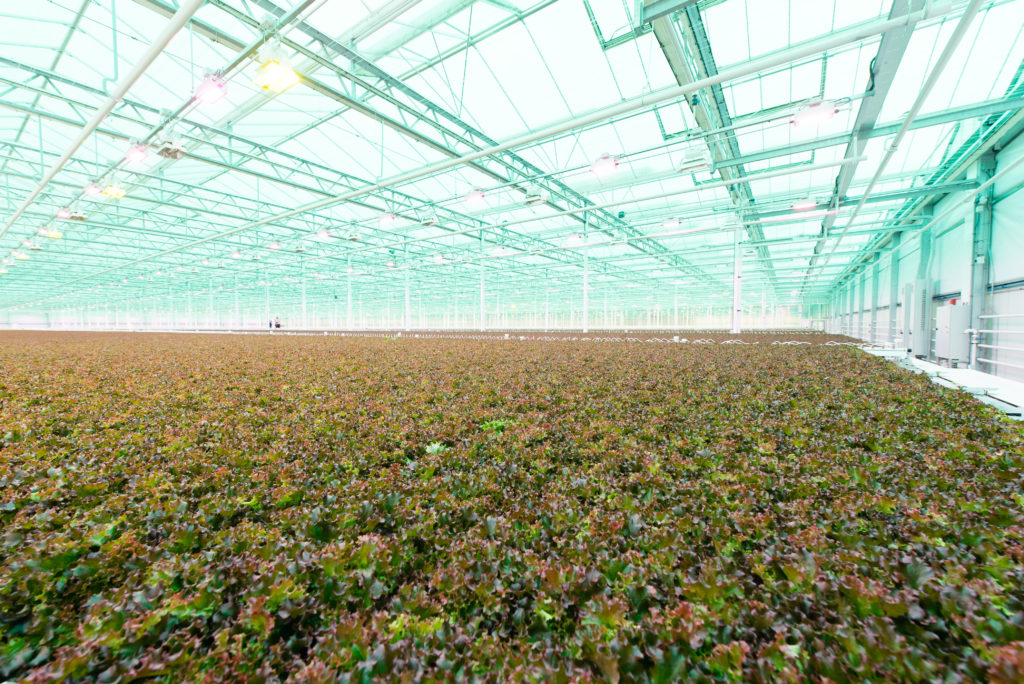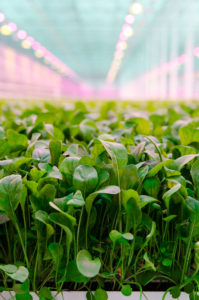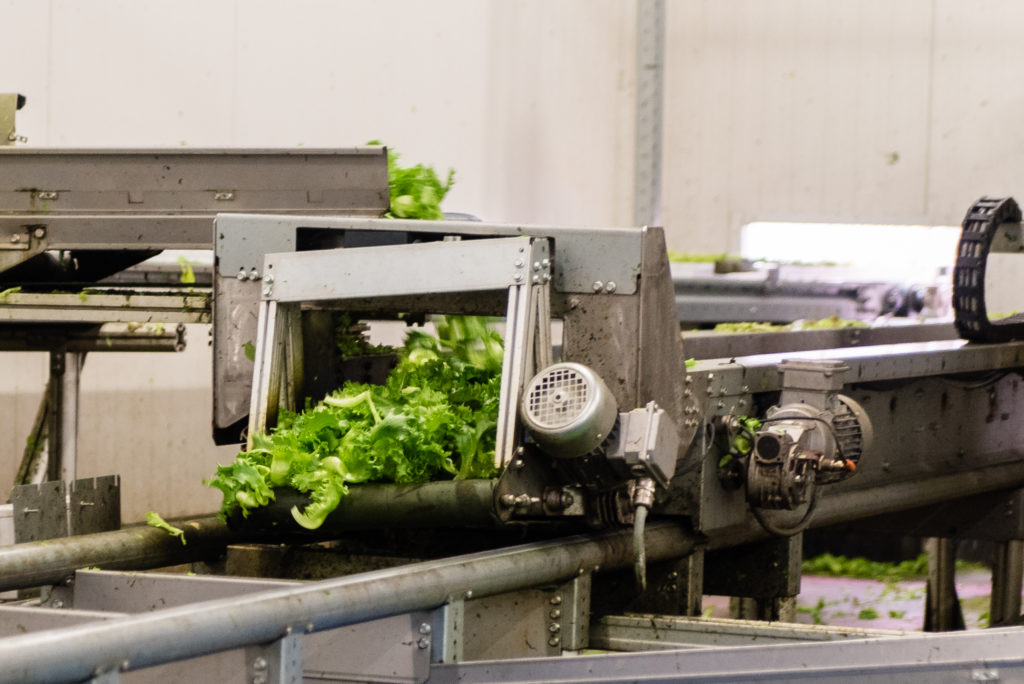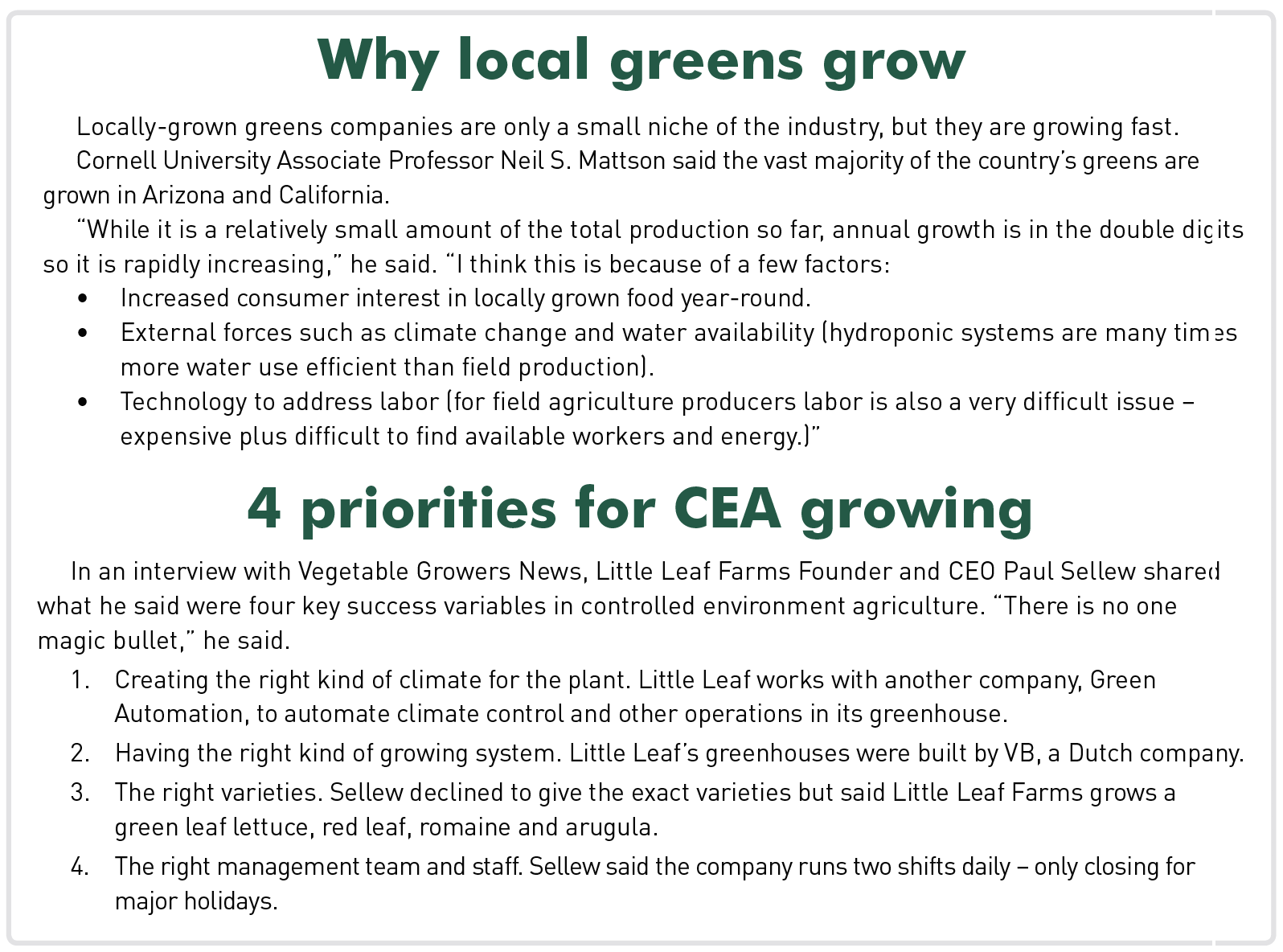

Dec 27, 2018Boston’s Little Leaf Farms plans 10 acres under glass
A fast-expanding leafy greens operation outside Boston is another example of how consumers buying local are supporting new regional growers of leafy greens.
Thirty-five miles west of Boston, Little Leaf Farms this spring celebrated doubling its greenhouses from 2.5 acres to 5 acres. The operation plans to double its size again, to 10 acres, by late 2019 or early 2020.
“I’m a believer that the local movement is here to stay, and the ability to service that with state-of-the-art controlled environment facilities using greenhouse technology is here to stay,” said Little Leaf Farms Founder and CEO Paul Sellew. “We’re going to continue to invest.”


Tip of the iceberg
In a statement at the Little Leaf Farms’ ribbon-cutting ceremony, for the expanded facility, Henry P. Kendall Foundation Executive Director Andrew Kendall explained why a local food system in the Northeast is important.
“More than 98 percent of the lettuce we eat in this country is grown on the West Coast and shipped for days, which means customers in New England are not receiving the highest quality or freshest product,” Kendall said.
But it’s not just Little Leaf Farms that is expanding to supply the Northeast and Midwest with locally-grown greens, and one need not look far afield to find other examples of the movement. Hydroponics grower BrightFarms (four locations in the East and Midwest), and AeroFarms (four locations in New Jersey) – co-founded a food safety organization with Little Leaf Farms. Gotham Greens (four locations so far in New York City and Chicago) has plans for ambitious growth. Revolution Farms, a recently launched aquaponics operation in west Michigan, has a 50,000-square-foot state-of-the-art greenhouse near Caledonia along with a 35,000-square-foot aquaculture operation.
In some ways, the local greens movement mirrors what’s already been happening with tomato production. Sellew’s previous business venture was Backyard Farms, a 42-acre tomato greenhouse near Madison, Maine. Sellew is from a farm family – his brother, Mark, grows ornamentals at Prides Corner Farms in Connecticut. Backyard Farms was sold, but Paul Sellew began looking for a similar venture.
“I left Backyard Farms, so I basically was looking for the next venture, and I felt nobody had really done this yet with leafy greens, done it the way I think it should be done, which is a state-of-the-art greenhouse with intelligent automation built in,” Sellew said. “So, I just felt there was an opportunity. I mean, as we know, the leafy greens are concentrated out in Salinas and Yuma, and they supply North America, so with Boston being the farthest, most eastern point in the continental United States, I felt this was a great market to start on a local greenhouse and that’s what we did.”


How it’s grown
Little Leaf Farms grows a green leaf lettuce, red leaf, romaine and arugula – Sellew said the farm is developing its capacity for kale and spinach. Salad mixes are packaged in 3-pound food service bags as well as smaller tubs that are sold at grocery stores.
The greenhouses were built by Netherlands-based VB. The leaves, nestled in rockwool-lined mobile gutter system, are grown using a nutrient film technique. The plants are irrigated with rainwater captured from the greenhouse roof.
Greens are grown without pesticides and the growing environment is clean enough that they do not need to be washed with chlorine-based washing agents.
Much of the greenhouse operations are automated, and the company certifies to customers that its greens are “Clean from the Start” and are in fact never touched by human hands during the seeding, growing, cutting and packaging processes.
“We work with a company called Green Automation,” Sellew said. “They have a good growing system and then we combine that with creating a climate in the greenhouse for year-round growing, which is just as important as the growing system.” Natural light is supplemented by LEDs and high-pressure sodium lights, which are automatically adjusted by sensors that measure photons at the plant level.
Although there’s been some indication the USDA could open the door for more organic growers to qualify for its organics system, Sellew said he’s not interested in pursuing that designation.
“For us, we grow without pesticides, herbicides, fungicides,” he said. “We think we’re beyond organic. We don’t see the organic certification as such a big deal.”
Food safety 2.0


A new generation of greens growers is setting its own industry standards. In the spring, Little Leaf Farm, Bright Farms and AeroFarms founded a coalition to talk about food safety standards for controlled environment agriculture (CEA).
“We felt that growing in a controlled environment, as opposed to a field environment is different,” Sellew said. “We felt that the need to sort of look at our specific needs and come up with a food-safety program that would be tailored for what we do in a controlled environment.”
Both the United Fresh Produce Association and Produce Marketing Association (PMA) applauded the group’s formation.
“By coming together, these leaders will advance food safety for controlled environment growers and for the fresh produce industry as a whole, which in turn will benefit consumers and public health,” said Bob Whitaker, PMA chief science and technology officer. “They ask good questions about how to ensure their particular practices produce safe products and have demonstrated they are willing to learn from and share ideas on risk- and science-based food safety with their open agriculture counterparts.”
Sellew said since the group formed, interest has grown.
“Many of the other CEA producers are joining with us because they think along similar lines,” he said.
– Stephen Kloosterman, VGN Associate Editor















